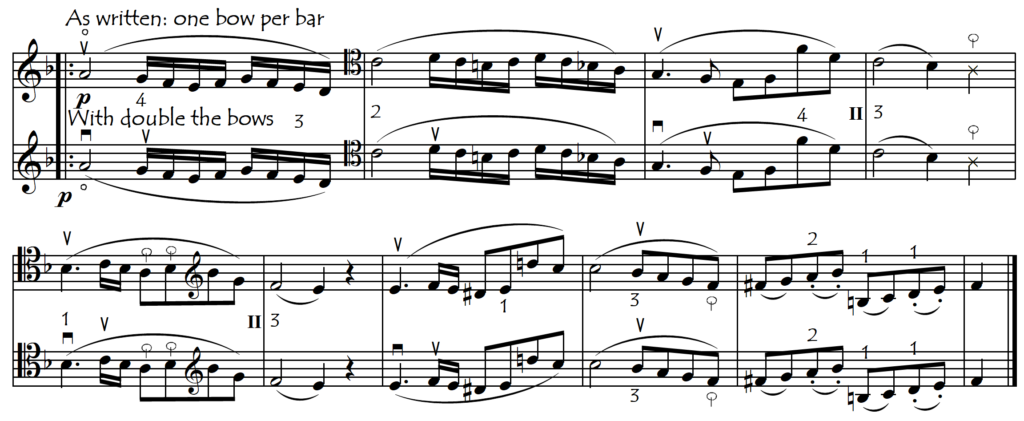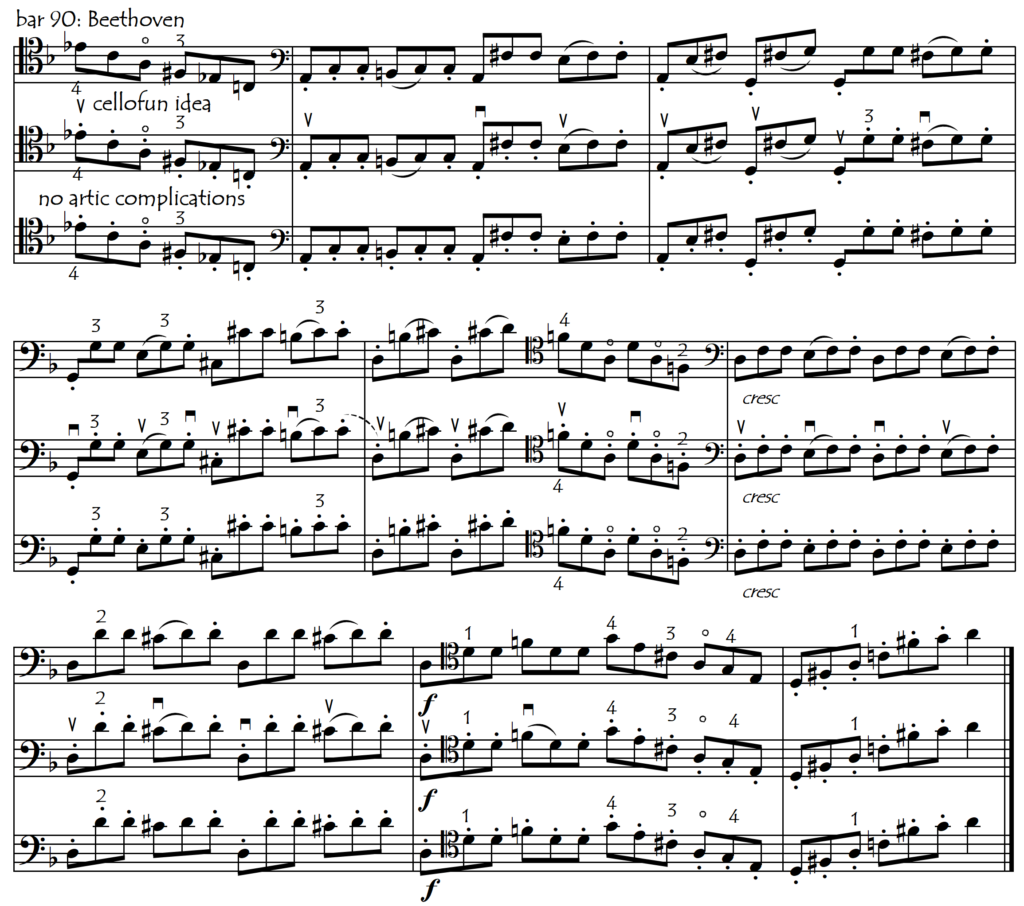Beethoven Violin Sonata Op 24 in F “Spring”: For Cello
This extraordinary sonata is here transcribed in the original key. If we were to take it down a fifth then it would lie in a much easier register (almost always in the Neck Region with very occasional forays up into the Intermediate Region). However many of the lower passages would then lie on the two lower strings where they simply don’t sound appropriately melodic. Bars 11-22, 127-135 and 147-150 in the first movement are good examples of such passages:

A more satisfactory compromise therefore would seem to be to stay in the original key but to transpose of some the highest passages down an octave in such a way (transposing entire phrases) that the musical line is unaffected. Therefore the entire Scherzo is taken down an additional octave but none of the Trio. The theme of the Rondo also is treated in the same way, as shown in the following example:

Several pianists have had the kindness to record the piano accompaniment for all movements on YouTube, so we have quite a large choice of pianists with whom we can play this sonata anytime we wish. The piano part is of course the same as for the violin and can be downloaded from imslp.org.
FIRST MOVEMENT
The theme of this movement gives us food for thought with respect to the question of bow speed, bow pressure and asphyxia. Using one bow per bar for the first seven bars is what Beethoven wrote, what all violinists do and what we would like to do, but is this always the best bowing solution for the cello? In this melody, we are entering into the grey area where – depending on the room size and acoustics, the quality of our cello/bow, our own technical skill and, of course, the chosen tempo – we may want to get more sound and freedom by using two bows per bar. Almost certainly, a double-bassist would use two bows per bar, but on the cello …… ? With these questions and doubts in mind, the suggested bowing for this theme in the Easier Version is two bows per bar whereas in the Concert Version, it is one bow per bar.

The only note modifications that have been made in this transcription for cello are: bar 86, double stop octave removed, bar 160, chord revoiced, and last four bars transposed down an octave:
Here is a play-along audio accompaniment, played very musically by Jorge Nava and offered on his YouTube channel. Many thanks for your generosity, Jorge ! A two-bar introduction has been added so that we can know when to start.
SECOND MOVEMENT
Here is a play-along accompaniment, with thanks to the Piano Concert Accompaniment channel on YouTube:
THIRD AND FOURTH MOVEMENTS
In our Performance Versions, quite a lot of these two movements – most notably, the entire Scherzo (but not the Trio) and the main theme of the Rondo – have been transposed down an additional octave (see the Literal Transcription for a comparison). Apart from the revoicing of a few chords, no other note changes have been made. The “Easier Version” is easier than the Performance Versions in two ways:
- the highest passages have been brought down by an octave
- in the many fast, fiddly bits – which are really quite difficult although not in the high register – the notes have not been changed but the complex bowings, slurs and articulations have been removed.
MOVT III: SCHERZO AND TRIO
The Scherzo needs to be very fast and lively but if we try to play the Trio at this same tempo we are likely to struggle. Therefore, the following play-along piano accompaniment (thanks once again to the Piano Concert Accompaniment channel on YouTube) has been edited so that the Trio is taken at a slightly slower speed than the Scherzo:
MOVT IV: RONDO
Finding the right tempo for the Rondo (final movement) is not easy. It is our ability to play the many fast, tricky triplet passages that come later in the movement that should determine our choice of tempo rather than the speed at which we would like to play the opening theme. It is very easy to take a tempo for the theme that is too fast for what comes later: no doubt that is why Beethoven wrote: “Allegro ma non troppo” (my italics and underlining).
Perhaps this is also the reason why Beethoven writes the theme with an articulation that seems almost anti-natural. After all the short, spiky, chopped staccatos of the Scherzo, it would feel so natural to play the eighth notes of the Rondo theme in a singing, legato manner rather than with Beethoven’s lilting 2-and-2 slurs. But those little slurs do give an added articulation colour and interest which feels especially appropriate in a somewhat slower tempo:

The fast, tricky triplet passages that recur frequently in this movement provide us with some very good study material for the type of fast passages in which a lot of the difficulty comes from the tricky, irregular, right-hand articulations rather than from the actual notes. If we play these passages with separate bows they become suddenly so much easier:

Apart from the main theme, bars 98-112, 212-215, 228-234 and 239-242 have also been transposed down an additional octave.
Here is the play-along piano accompaniment (thanks once again to the Piano Concert Accompaniment channel on YouTube):
